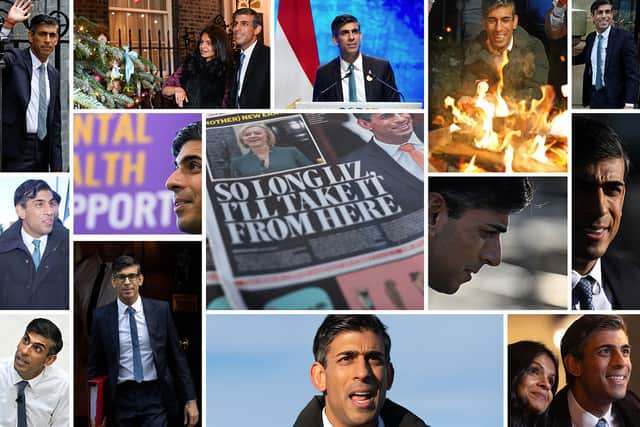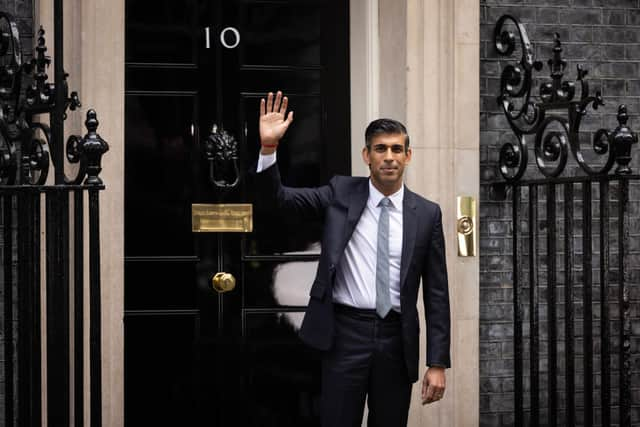Rishi Sunak’s first 100 days in office: how has he performed as Prime Minister so far?
and live on Freeview channel 276
The weeks and months leading up to Rishi Sunak’s appointment as Prime Minister felt something like a fever dream. There was Liz Truss’s whirlwind 45 days in office, which saw an open Tory rebellion and the crash of the financial markets. Prior to that, Boris Johnson made his dramatic departure from Downing Street, driven out by scandal upon scandal - from Chris Pincher to Partygate.
When Sunak arrived in Number 10 then, his task was essentially to calm things down. And the new Prime Minister’s demeanour upon his appointment - which was decidedly calmer and less celebratory than some of his predecessors - made it seem like this was possible. Levelling Up Secretary Michael Gove even proudly boasted that “boring is back”, which to many, felt like a huge relief.
Advertisement
Hide AdAdvertisement
Hide AdBut while the Prime Minister succeeded in bringing an end to what had begun to feel like a circus - namely, by settling the financial markets - his first 100 days in office have been anything but calm. The country has been plunged into chaos by the biggest set of strikes in decades, the crisis in the NHS has seen ambulances queuing outside hospitals and patients forced to wait for over 12 hours to be seen by a doctor, and MP scandals are as rife as ever.
The latter of these is particularly damaging for Sunak, because he made such a huge point - even including it in his first official speech as Prime Minister - of his intention to bring “integrity, professionalism, and accountability” to “every level” of government. He said: “I understand that I have work to do to restore trust after all that has happened. Trust is earned and I will earn yours.”
It was a difficult challenge he was committing to, but it was a remarkably refreshing take at the time. Sunak didn’t seem to be hiding from the fact that public opinion of politicians was at an all-time low - and he seemed to understand that it would be actions, not words, that would help him in the battles ahead. That’s why some of what came next felt all the more disappointing.


First, just days after she resigned for breaking the Ministerial Code, Sunak chose to appoint Suella Braverman as Home Secretary in his Cabinet. His choices for his top team were essentially the first indicator of the type of administration he would be running - so appointing to the Home Office, the department responsible for keeping the UK safe, the same person who had breached government security rules, wasn’t exactly a good look. It also didn’t scream “accountability”.
Advertisement
Hide AdAdvertisement
Hide AdBut things moved on. There were more important things to worry about, such as the ongoing cost of living crisis and the challenges faced by the NHS, which is why Sunak was likely less than pleased when another Tory scandal caught everyone’s attention.
In November, the Prime Minister was forced to launch an independent probe into the conduct of his Deputy PM. Dominic Raab had been accused of bullying - with multiple allegations from civil servants who claimed they had been too scared to enter his office. All accusations have been denied by Raab, but there are a total of eight formal complaints - from his time at three different departments - according to Number 10. There are at least 24 civil servants involved in the complaints, including three departmental chiefs.
Sunak’s response was to order a probe by top lawyer Adam Tolley KC. Downing Street has insisted the Prime Minister was not aware of formal complaints before appointing Raab, but has failed to deny that he was aware of informal complaints. Reports meanwhile say that Sunak was warned about Raab’s “unacceptable behaviour” over the summer of 2022.
This issue appeared again with Nadhim Zahawi, whose tax scandal dominated the headlines for the first weeks of 2023. While Sunak has insisted he has ensured “accountability” in his government by ordering an investigation and subsequently sacking Zahawi, questions still remain over when he became aware of the scope of the situation.


Advertisement
Hide AdAdvertisement
Hide AdNewly appointed ethics adviser Sir Laurie Magnus concluded that Zahawi had breached the Ministerial Code seven times - and his investigation makes clear that the scandal dates all the way back to 2020. In the summer, before Sunak became Prime Minister, it was revealed that Zahawi was under investigation by HMRC - so the information had been in the public domain for a while, even if all the facts hadn’t been straightened out just yet.
One argument - and a somewhat fair one - in defence of Sunak is that his time in office, which he vowed to spend fixing the NHS, tackling illegal migration, and reducing inflation, has been marred and disrupted by the actions of others. After all, it was Zahawi who repeatedly failed to declare he was under investigation, it was Braverman who failed to adhere to government security rules, and it was Raab who allegedly bullied his employees and colleagues.
But Sunak had promised a stronger response to these situations - to not let things like this slide and ensure “integrity, professionalism, and accountability”. They were strong words, but his actions didn’t match up.
Elsewhere, Sunak has tried to tackle industrial action by bringing in controversial ‘anti-strike’ legislation. His supporters have hailed this as a way to ensure minimum service levels for the public, but the crackdown has faced backlash - and according to the polls, public opinion sways hugely in support of nurses.
Advertisement
Hide AdAdvertisement
Hide AdOn the NHS then, the government pledged “record levels” of funding - but nurses, doctors and other healthcare professionals are still crying out for further help as they strike over pay, staff shortages and patient safety. More needs to be done, they say, and there are concerns that they aren’t being heard.
Where Sunak has stood firm is on the economy, which, despite an ongoing cost of living crisis, has calmed to a certain extent. On Ukraine, the Prime Minister has maintained the UK’s commitment to the war-torn country, becoming the first NATO leader to vow to send modern Western battle tanks to help soldiers fight the invasion from Russia.
The Prime Minister has also continued with his commitment to tackle Channel crossings, frequently mentioning his pledge to crack down on illegal migration. But as with many of the challenges he faces, the immigration debate is a complex one - with shocking recent news of asylum seeking children going missing from Home Office hotels, and more debate sparked by the High Court’s decision to review the government’s controversial Rwanda deportation policy.
So, a lot has happened in those first 100 days in office. Of course, Sunak can’t fix long-standing problems such as the crisis in the NHS and discontent in public service sectors win just a few months. But he’s fallen short of the promises he so clearly set out at the beginning of his premiership - particularly on integrity in government.
Advertisement
Hide AdAdvertisement
Hide AdThe chaos seems here to stay at the moment, and there’s probably no point in guessing what type of roller coaster the country will be on in the coming months - because if we’ve learned anything, it’s that anything can happen. But what is clear is that the Prime Minister definitely has his work cut out for him, with the next 100 days likely to be as testing as those which came before.
And although it may seem far away, Sunak has to be looking towards the next general election - which according to current poll estimates, isn’t looking great for the Conservatives. So the Prime Minister might need a serious regroup of what he hopes to accomplish and how he wants to act before then, particularly if he wants to stick with his “accountability” mantra.
Comment Guidelines
National World encourages reader discussion on our stories. User feedback, insights and back-and-forth exchanges add a rich layer of context to reporting. Please review our Community Guidelines before commenting.
